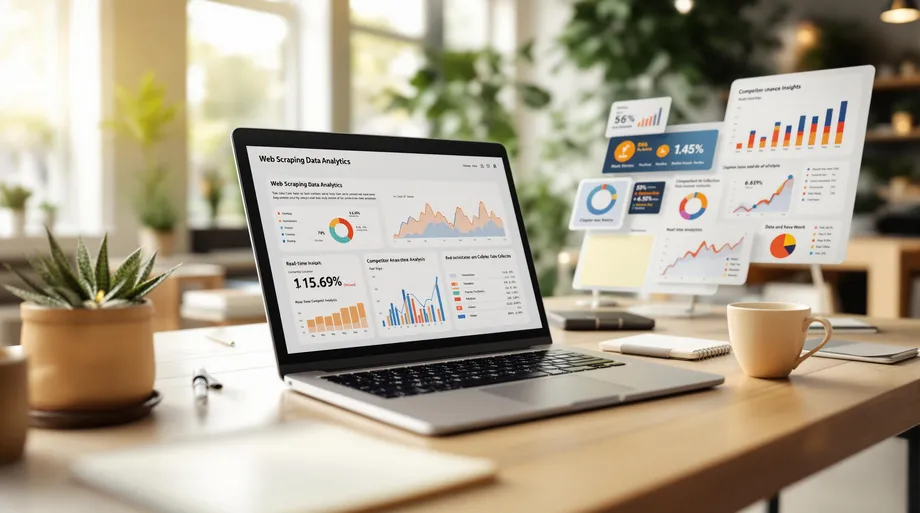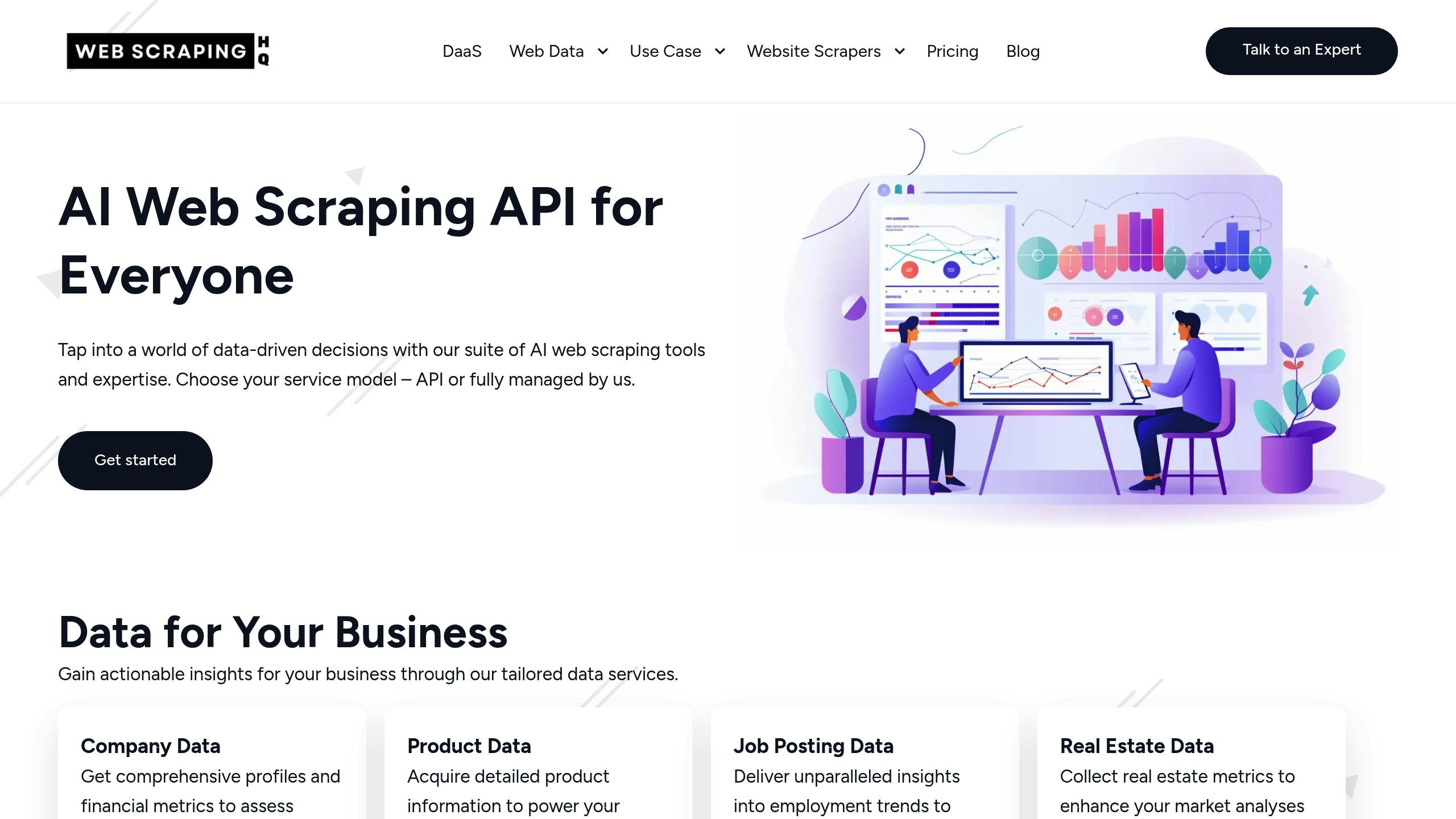
- Harsh Maur
- February 22, 2025
- 8 Mins read
- Scraping
Web Scraping for Content Marketing: Fuel Your Strategy with Real-Time Insights
Web scraping is a fast and automated way to gather data online, saving time and effort for content marketers. It helps you track competitors, find trending topics, collect SEO data, and refine strategies based on real-time insights. Key benefits include:
- Lower Costs: Automates data collection, reducing the need for expensive surveys or focus groups.
- Competitor Analysis: Understand competitors' strategies by analyzing their content and pricing.
- SEO and Keyword Research: Extract useful data directly from search engine results to improve rankings.
- Trend Spotting: Stay ahead by identifying emerging topics and audience interests early.
- Social Media Monitoring: Track engagement and sentiment in real time to shape campaigns.
Quick Comparison of Popular Web Scraping Tools:
| Tool | Starting Price | Key Features | Rating |
|---|---|---|---|
| ScraperAPI | $49/month | Geo-targeting, 100K API credits | 4.7/5 |
| Octoparse | $119/month | 100 tasks, easy-to-use interface | 4.3/5 |
| ParseHub | $189/month | Advanced scheduling, custom APIs | 4.3/5 |
| Bardeen | $10/month | AI-powered scraping, automation | - |
Main Advantages of Content Marketing
Web scraping offers a cost-effective way to gather real-time data, making it a game-changer for content marketing. Key benefits include reduced data collection costs, competitor analysis, topic research, and SEO automation.
Lower Data Collection Costs
Compared to traditional methods like surveys or focus groups, web scraping significantly reduces data collection expenses. Automation allows teams to focus their resources elsewhere.
"Web scraping allows content marketers to gather large amounts of data quickly and at a fraction of the cost."
For instance, scraping the Hacker News feed daily costs just a few dollars. However, increasing the frequency to every ten minutes can quickly drive up expenses. To keep costs manageable, you can:
- Use prebuilt datasets for recurring data needs
- Schedule tasks during off-peak hours
- Opt for serverless solutions like AWS Lambda, where you only pay for what you use
Competitor Content Analysis
Web scraping isn't just about saving money - it also provides valuable insights into your competitors' strategies. For example, Alex Wilson from One Thing Digital combines tools like Screaming Frog, Google Sheets, and XML import functions to track competitor pricing in real time, offering actionable insights.
Content Topic Research
Finding the right topics is easier with web scraping. By analyzing online discussions and trends, you can identify topics that resonate with your audience. Daniel Heredia Mejias, for instance, used a Python-based TF-IDF model to extract and rank keywords, making topic research more efficient and aligned with audience interests.
SEO Data Collection
Web scraping automates the process of gathering critical SEO data, saving time and effort.
This efficiency is one reason why 93% of successful B2B content marketers say their organizations are highly committed to content marketing, with 70% reporting consistent year-over-year improvements.
Common Uses in Content Marketing
Web scraping has become a go-to tool for content marketers, offering practical ways to simplify workflows and stay ahead of competitors.
Research Automation
Content marketing often requires quick and thorough research. Web scraping automates what used to be time-consuming manual tasks. For example, in October 2024, Niall McNulty created an AI publishing assistant that scrapes user-generated content from forums and subreddits. The data is then processed through an SQL database and turned into structured articles using GPT-4. This process cuts research time from hours to minutes, all while maintaining high-quality results. It also provides a solid foundation for better keyword and content planning.
Keyword Analysis
Web scraping is a powerful way to gather keyword data directly from SERPs. This includes pulling information from "People also ask" sections, related search suggestions, featured snippets, and competitor meta descriptions. These insights go beyond what traditional keyword tools can offer, giving marketers a clearer picture of search trends and user intent.
Content Collection
Web scraping also helps marketers compare search results across regions. For instance, ScraperAPI can highlight key differences between markets:
| Aspect | US Market | UK Market |
|---|---|---|
| Product Names | Standard terms | Region-specific terms |
| Currency | USD pricing | GBP pricing |
| Top Rankings | US-based sites | UK-based sites |
| Ad Content | US-targeted ads | UK-targeted ads |
This kind of data can guide localized content strategies and ensure marketing messages resonate with different audiences.
Social Media Monitoring
Web scraping provides real-time insights into social media trends and audience reactions. A great example is Ocean Spray's March 2023 viral campaign. By tracking TikTok engagement, they spotted and amplified viral content featuring their products, turning it into a highly successful promotional effort.
Topic Trend Analysis
Spotting trends early is another major benefit of web scraping. This involves:
- Automatically pulling data from Google Trends
- Tracking seasonal patterns and competitor strategies
- Reviewing content performance across various platforms
These insights help marketers stay ahead of the curve and create content that aligns with emerging interests.
sbb-itb-65bdb53
Web Scraping Tools and Methods
Using the right tools and staying within legal boundaries is crucial for effective data collection in content marketing. Here's an overview of tools and practices as of early 2025.
Popular Scraping Tools
There’s a wide range of tools available to suit different content marketing needs. ScraperAPI stands out with its 4.7 Trustpilot rating and offers new users a free trial of 5,000 API credits. Their $49/month plan provides 100,000 API credits along with US and EU geo-targeting.
Here’s a quick comparison of top-rated tools for content marketers:
| Tool | Starting Price | Key Features | Rating |
|---|---|---|---|
| ScraperAPI | $49/month | US/EU geo-targeting, 100K API credits | 4.7/5 |
| Octoparse | $119/month | 100 tasks | 4.3/5 |
| ParseHub | $189/month | Advanced scheduling, custom APIs | 4.3/5 |
| Bardeen | $10/month | AI-powered scraping, automation | - |
These tools simplify data collection, making them valuable for content marketers.
Legal Guidelines
While tools are important, staying compliant with legal standards is equally critical. Here are some key legal considerations for web scraping:
-
Data Protection Compliance
When scraping data involving EU residents, ensure compliance with GDPR. For example, the 2023 Clearview AI case resulted in a €20 million fine due to improper data handling and lack of transparency. -
Rate Limiting
Avoid overwhelming websites by setting reasonable scraping speeds. In February 2025, Darrielle Evans, a software developer, used a 3-second delay between requests while building her apartment comparison tool with Webscraper.io. -
Terms of Service
Always review and follow the terms of service for target websites. The 2000 eBay vs. Bidder's Edge case showed that excessive scraping could be treated as trespassing on digital property.
Web Scraping HQ

For those looking for managed services, Web Scraping HQ provides tailored solutions for content marketing. Their Standard plan ($449/month) delivers structured data in JSON/CSV formats and includes automated quality checks. The Custom plan (starting at $999/month) offers advanced features like custom data schemas, self-managed crawling, enhanced quality assurance, and 24-hour priority support.
Web Scraping HQ specializes in extracting diverse content types - such as company profiles, product details, and news articles - while ensuring compliance with legal standards and delivering high-quality data.
With the right tools, legal awareness, and specialized services, content marketers can collect data efficiently and responsibly.
Advanced Web Scraping Tips
Finding Industry Influencers
Identifying the right influencers takes more than basic searches - it calls for advanced scraping methods. Hexomatic's April 2024 workflow combines Google search operators, Email Discovery, and Social Links Scraper to build comprehensive influencer lists.
Here’s how to use Google search operators effectively:
| Operator | Purpose | Example |
|---|---|---|
| intitle: | Locate bloggers with specific terms | intitle:"content marketing" blogger |
| site: | Focus on specific platforms | site:linkedin.com "content strategist" |
| Location-specific | Find regional influencers | "(Blogger OR influencer) NY" |
"Web scraping unlocks a wealth of data that marketers can use to enhance nearly every aspect of their strategy." - Sandro Shubladze, CEO and Founder, Datamam
These methods not only help identify influencers but also lay the groundwork for broader social data analysis.
Social Media Data Collection
Before diving into social media scraping, define the exact data points you need. For Instagram, tools like Selenium paired with CSS selectors can help extract image URLs and captions with precision.
Key areas to focus on:
- Engagement metrics
- Performance indicators for content
- Hashtag trends
- Audience sentiment patterns
When combined with influencer data, these insights provide a clearer picture of your target audience.
Targeted Campaign Data
Scraping for targeted campaigns goes beyond general monitoring. It helps uncover detailed performance metrics. Focus on:
- Audience behavior trends
- Content engagement levels
- Platform-specific results
- Insights into Competitor Strategies
To avoid issues like server overload or being blocked, always include rate limiting in your scraping scripts.
Data Quality Control
Ensuring high-quality data is critical. Use these tools for validation:
| Tool | Best For | Key Features |
|---|---|---|
| Cerberus | Smaller projects | Schema-based checks, flexible rules |
| Pydantic | Complex APIs | Type validation, automatic data conversion |
Steps for data validation:
- Verify accuracy: Ensure data matches the source and is correctly encoded and formatted.
- Monitor completeness: Set up alerts for missing data points.
- Check timeliness: Use timestamps to flag outdated information.
Web Scraping and Content Marketing: A Powerful Pairing
Web scraping gives content marketers access to real-time data that can drive smarter decisions. With over 90% of all existing data created in just the past two years, gathering and using this information effectively has never been more important. To turn raw data into meaningful strategies, marketers need a structured and compliant approach.
The numbers speak for themselves: personalized marketing efforts, fueled by data, can increase sales by an average of 20% [2]. Industry experts agree that scalable data extraction is a must for staying competitive in today’s fast-paced market.
To make the most of web scraping, content marketers should prioritize these four areas:
- Data quality assurance: Ensuring the information collected is accurate and useful.
- Legal compliance: Following regulations to avoid potential issues.
- Market intelligence: Gaining a clearer understanding of competitors and trends.
- Customer insights: Learning what your audience wants and needs.
With 27% of marketers identifying organic search as their top source for leads [2], web scraping becomes a key tool for refining strategies and staying ahead of the competition. It can lower data collection costs, improve competitor analysis, and streamline quality control - helping marketers craft more effective and targeted content.